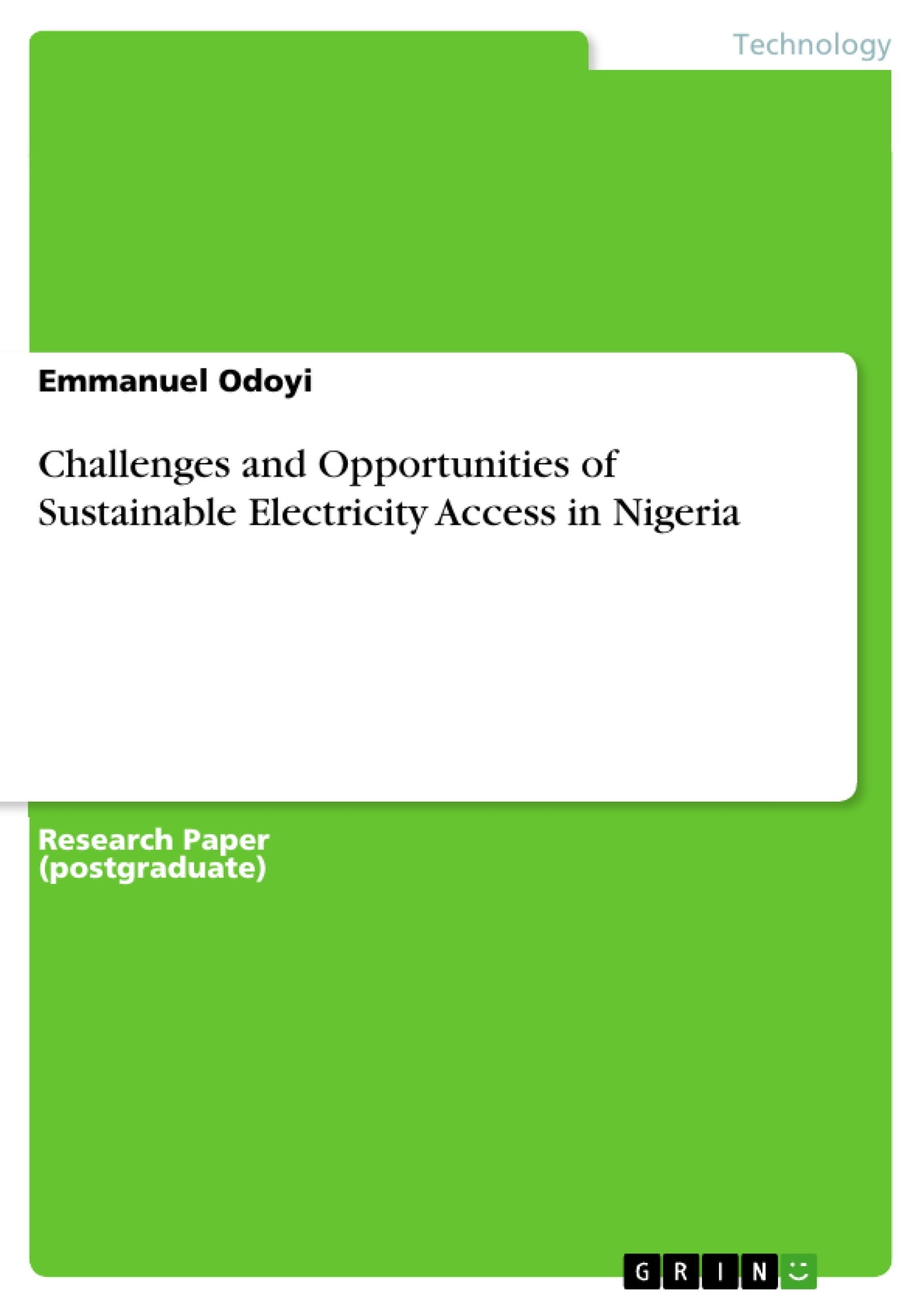Electricity is an important feature for economic development. The necessity lies in the fact that electricity affects every aspect of our economy. Nigeria should aim towards sustainable electricity access to its citizens. Nigeria must have a stable electrical energy supply to meet the market, basic needs of the people. A nation whose energy supply is not reliable does not help in the development of the national economy. Nigeria is a nation with more than 162 million inhabitants with less electric access to both rural and urban areas.
This study has reviewed and analyzed the challenges and opportunities facing Electricity Access in Nigeria. The study has employed approach to good features of sustainable development system in the Nigerian electrical energy sector by proposing a sustainable strategies and alternatives for energy access through the use of solar power, wind and hydro power, and Bio-mass . Also, the study clearly explained and analyzed the problems facing the electricity in Nigeria. Thus, this study has used literature review methods, to gather information’s on Energy Sector in general and existing literatures on the Nigeria Energy Sector as well as a SWOT/PEST Matrix of the Nigerian Energy sector.
Inhaltsverzeichnis (Table of Contents)
- Introduction
- Research Area
- Research
- Research Method
- Access to Electricity in Nigeria
- Nigeria and General Statistic
- PHCN (Power Holding Company of Nigeria)
- Challenges of Electricity Access in Nigeria
- Inadequate Infrastructure
- Underutilized Energy/Human Resources
- High Investment Cost
- Energy Mix
- Energy Use & Energy efficiency in Nigeria
- Energy Efficiency
- Energy Access and Improving access
- Energy poverty in Nigeria
- Impact and Implication
- Environmental Impacts
- Opportunities
- Investment Option as Opportunities
- Sustainability Electricity by Reform
- Employment Opportunities
- Efficiency and Reliable Services
- Energy Alternatives and Strategies
- Biomass Energy
- Wind Energy
- Solar Power
- Hydro Power
- SWOT/PEST Matrix of the Nigeria Power Sector
- Conclusions and Recommendation
- References
Zielsetzung und Themenschwerpunkte (Objectives and Key Themes)
This study aims to examine the challenges and opportunities facing electricity access in Nigeria. It seeks to understand the existing problems within the Nigerian energy sector and propose sustainable strategies and alternatives for energy access. The study uses theoretical research methods and a SWOT/PEST analysis to evaluate the current state of the sector.
- Challenges of electricity access in Nigeria
- Sustainable electricity access strategies
- Impact of energy poverty on Nigerian society
- Opportunities for investment and development in the energy sector
- Role of renewable energy sources in improving electricity access
Zusammenfassung der Kapitel (Chapter Summaries)
The introductory chapter provides a background on the importance of electricity access for economic development in Nigeria, highlighting the challenges and opportunities. It also outlines the research area, methodology, and objectives of the study. The following chapters delve into the current state of electricity access in Nigeria, analyzing the challenges faced by the Power Holding Company of Nigeria (PHCN). These challenges include inadequate infrastructure, underutilized resources, high investment costs, and an inefficient energy mix. The study then explores the concept of energy poverty in Nigeria and its associated impacts, focusing on the need for energy efficiency and improved access. The final section delves into potential opportunities for improving electricity access in Nigeria, including investment options, reform strategies, and the use of renewable energy sources.
Schlüsselwörter (Keywords)
The primary focus of this study is electricity access in Nigeria, encompassing challenges, opportunities, and the exploration of sustainable renewable energy sources. The study highlights issues related to energy poverty, energy efficiency, and the need for a comprehensive reform of the Nigerian energy sector. Additionally, it emphasizes the potential benefits of utilizing renewable energy sources like solar, wind, and hydro power. The study ultimately aims to contribute to the development of a sustainable electricity access system in Nigeria.
Frequently Asked Questions
What are the main challenges for electricity access in Nigeria?
The primary challenges include inadequate infrastructure, underutilized human and energy resources, high investment costs, and an inefficient energy mix.
How does energy poverty affect the Nigerian economy?
Unreliable energy supply hinders national development, affects all economic sectors, and prevents the country from meeting the basic needs of its 162+ million inhabitants.
Which renewable energy sources are proposed for Nigeria?
The study proposes the use of solar power, wind energy, hydro power, and biomass as sustainable alternatives to improve access.
What role did the PHCN play in Nigeria's power sector?
The Power Holding Company of Nigeria (PHCN) was the central entity facing these infrastructure and resource challenges, which are analyzed in the study.
What methodology was used in this research?
The study employed literature reviews and a SWOT/PEST matrix to analyze the Nigerian energy sector and propose reform strategies.
- Quote paper
- Emmanuel Odoyi (Author), 2013, Challenges and Opportunities of Sustainable Electricity Access in Nigeria, Munich, GRIN Verlag, https://www.grin.com/document/271639



